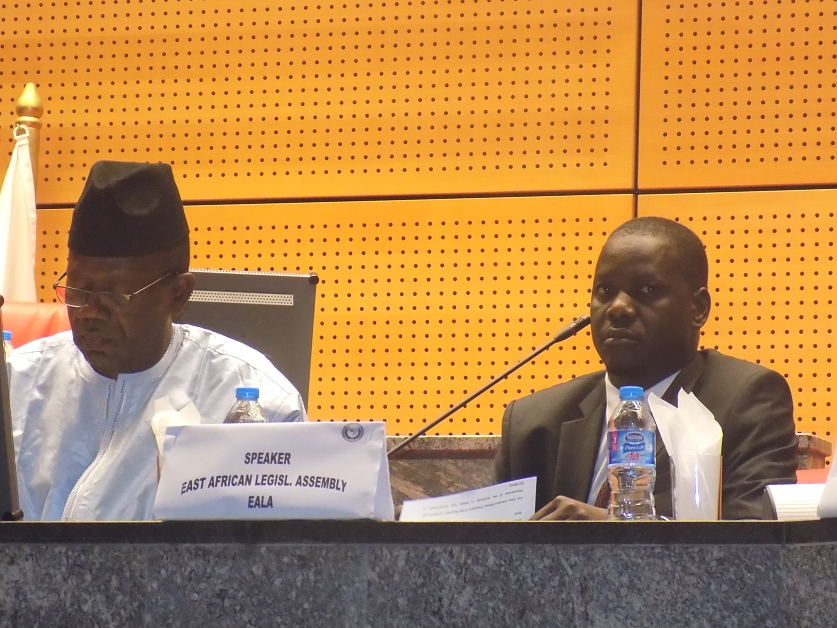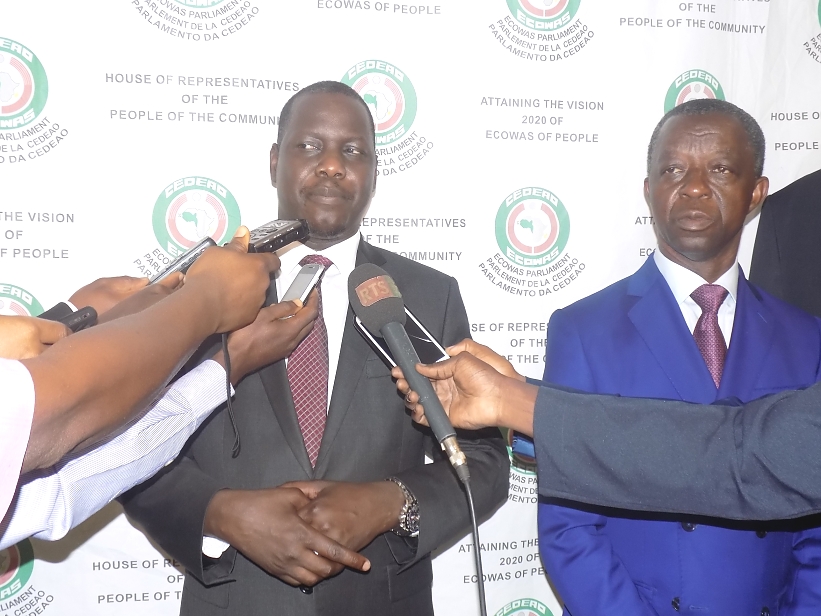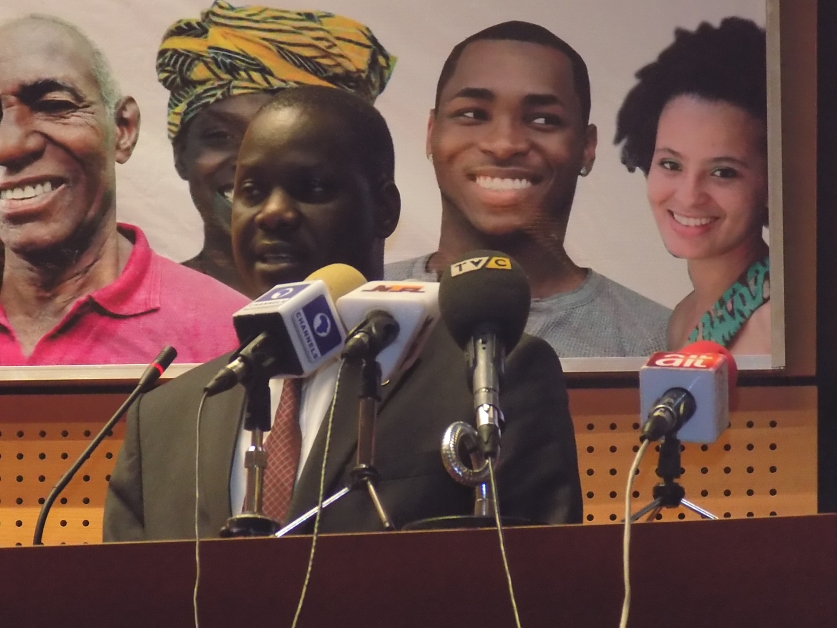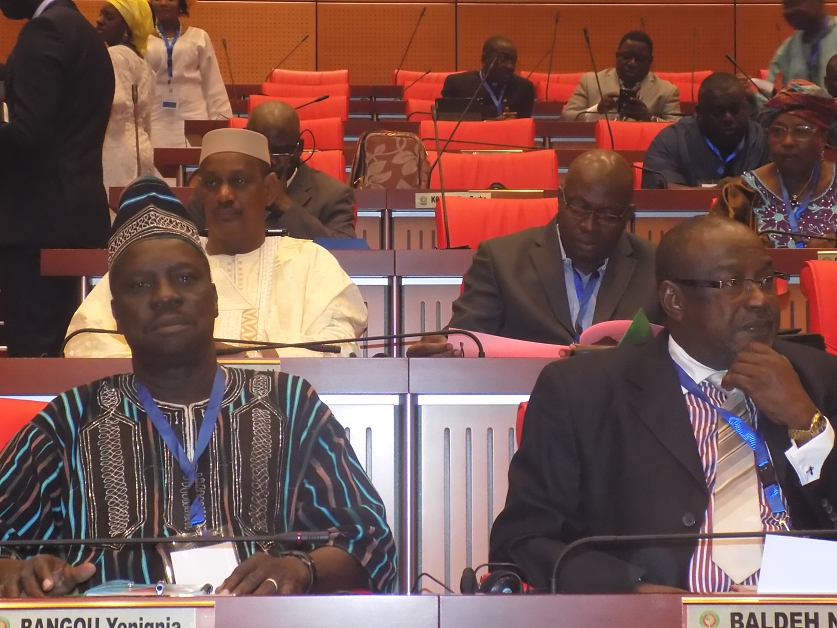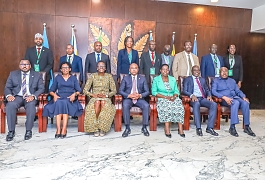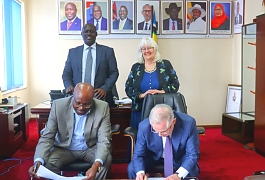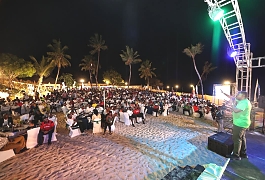East African Legislative Assembly, Abuja, Nigeria: September 22nd, 2016: The EALA Speaker, Rt Hon Daniel Fred Kidega says the time for the Economic Community of West African States’ (ECOWAS) Parliament to get Legislative powers is now, Such a move, Rt Hon Kidega notes would be a precursor to capacitate the Legislature to enact laws and respond to demands of the populace of the West African region. Consequently, the EALA Speaker is urging the 4th Legislature to up the push on the adoption and signing of the Supplementary Act on the Enhancement of powers of the said Parliament.
Rt Hon Daniel Fred Kidega made the remarks on September 22, 2016, as he delivered a solidarity message to the Assembly at the commencement of the 2nd Ordinary Session of the ECOWAS Parliament at the Parliamentary buildings in Garki, Abuja, Nigeria.
He further remarked that it was in the best interest of the bloc to speed up integration to realise the aspirations of the founding fathers of ECOWAS and those of its citizens.
“In order to realise integration to its fullest, this may perhaps be – an opportune moment for the ECOWAS Parliament to transform itself into a legislative body capacitating it to enact laws that can influence change and to respond to the demands of the populations”, the Speaker said.
“I recall with vigour the 3rd Legislature had sought the enhancement of its powers to include the power to legislate in co-decision with the Council of Ministers, representation, budget appropriation and confirmation of statutory appointees of the Community Institutions. The 4th Legislature continues with the spirited campaign for the adoption and signing of the Supplementary Act on the Enhancement of the Powers of the Parliament, which shall give ECOWAS Parliament the desired legislative powers, an initiative that EALA totally and fully supports”, the Speaker added.
He said EALA had contributed to strengthening of the integration process at the EAC - given its legislative powers, by passing over 70 pieces of legislation, all key to upping the stakes for stability and development in the EAC region.
“Having superintended over an Assembly with legislative powers, there are enormous benefits of such an arrangement for the integration process,” he added.
The EALA Speaker remarked that it was also necessary for the discourse on legislative powers to be scaled-up to the continental level. At the moment, the South African based Pan-African Parliament (PAP) is also campaigning for the ratification of the new Protocol that is envisaged to give it powers to pass model laws for the continent. The new Protocol needs at least 28 ratifications to be enforced. At the moment, 10 countries have ratified the instrument but only two have returned (deposited) the same with PAP.
In an aired/televised message, the President of the Republic of Liberia and Chairperson of the Authority of ECOWAS Heads of State and Government, H.E. Ellen Johnson Sirleaf remarked that the ECOWAS Parliament was a catalyst and indeed at the fulcrum of integration.
President Sirleaf who was attending the United Nations General Assembly (UNGA) in New York, USA, maintained that ECOWAS was committed to achieving its 2020 Vision of a borderless and peaceful region, devoid of terrorism and other insecurities, and one that embraces good governance and employs total free movement of persons in the bloc.
The President remarked that ECOWAS region had realised a number of successes including the introduction of a regional e-passport, the first in the Continent and for its timely dispatch of a regional peace-keeping force to States that were facing conflicts. She however maintained the need to prioritise infrastructural projects and completion of outstanding protocols and signing of agreements such as the Economic Partnership Agreements (EPAs).
The Speaker of the ECOWAS Parliament, H.E. Mustaffa Cisse LO, stated at the very least, the ECOWAS Parliament would continue in its quest to find solutions for the ever-increasing regional challenges in migration and maritime security. He said ECOWAS’ mandate included holding consultations in key sector areas such as trade and investment to improve the standards of living and filtering of such resolutions to the ECOWAS Commission for implementation.
The opening ceremony was also addressed by the Speaker of the Pan-African Parliament, H.E. Roger Nkodo Dang, Speaker of the Parliament of Sierra Leone, Rt Hon Sheku Badara Bashiru Dambuya, President of the ECOWAS Commission and the President of the ECOWAS Court of Justice, Hon Justice Jérôme Traoré.
Over the next two weeks, the ECOWAS Parliament is expected to deliberate on a number of key matters including presentations of the draft report on the preparation of the preliminary draft of the 2017 budget of Parliament, consideration and adoption of reports of the Standing, Ad hoc and Joint Committees in Plenary. The Plenary shall also receive and consider the Country reports of its 15 Member States.
EALA has been collaborating with the regional Parliaments in sharing of information and in exchange of best practices. During the recent 8th Meeting of Annual Speakers, held under the aegis of the Pan-African Parliament in Midrand, South Africa, EALA Speaker was elected to chair the Caucus of Regional Speakers/leaders in Africa.
At the moment, other than the Parliament of the European Union, the EALA is the only other regional Parliament with legislative powers. EALA passes Bills on matters within the purview of the Community and such take precedence on the laws of the national Partner States on similar matters.
ABOUT ECOWAS
Established on May 28 1975 via the Treaty of Lagos, the Economic Community of West African States (ECOWAS) is a 15-member regional group with a mandate of promoting economic integration in all fields of activity of the constituting countries.
Member countries making up ECOWAS are Benin, Burkina Faso, Cape Verde, Cote d’ Ivoire, The Gambia, Ghana, Guinea, Guinea Bissau, Liberia, Mali, Niger, Nigeria, Sierra Leone, Senegal and Togo
Considered one of the pillars of the African Economic Community, ECOWAS was set up to foster the ideal of collective self-sufficiency for its member states. As a trading union, it is also meant to create a single, large trading bloc through economic cooperation.
ECOWAS PARLIAMENT
The Community Parliament was established by the Authority of Heads of State and Government of ECOWAS on the 6th of August 1994 when the Protocol on the Parliament was signed. The Protocol came into force in March 2000 and the Parliament was inaugurated on the 16th November of the same year. The role of the Parliament as provided for in the Protocol is “a forum for dialogue, consultation and consensus for the representatives of the peoples of the Community with a view to promoting integration”.
ECOWAS Parliament consists of 115 Members. The Parliament since its humble beginnings had been able to establish all its component Organs. The Plenary, the Bureau, the Conference of Chairmen and the Secretariat of Parliament have since commenced action in their various spheres of control and had been instrumental in the rapid growth of the Parliament.
-Ends-
For more Information,
contact: Bobi Odiko, Senior Public Relations Officer;
East African Legislative Assembly;
Tel: +255-27-2508240 Cell: +255 787 870945+254-733-718036 (both roaming in Abuja, Nigeria);
Email: bodiko@eachq.org
Web: https://www.eala.org
Arusha, Tanzania
